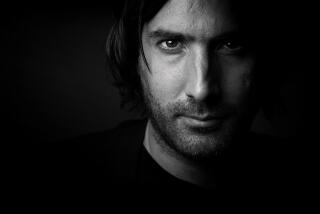From the losers’ side of the front line
- Share via
Up until the last few decades, history books tended to reflect only the interests and judgments of those who won the battles and elections, and to systematically exclude the viewpoints of those who lost. Therein lies one of the most exciting motivations for the writing of historical fiction: to allow men and women omitted from official accounts of events -- or even slandered -- to describe their experiences.
Much-praised Irish novelist Sebastian Barry has just such a goal in mind in “A Long Long Way,” the well-researched and moving story of a battalion of Irish soldiers fighting in World War I, many of whom would be buried near their trenches in Flanders and forgotten by everyone but their grieving families.
At the outbreak of the conflict, Ireland was an English colony stirring with revolutionary discontent, but many Irish remained loyal to the Crown when the call to arms was sounded. Barry centers his narrative on Willie Dunne, a quiet Dubliner just short of his 18th birthday who enlists in the British army. Willie leaves behind his caring father and sisters, and Gretta, the girl he intends to marry. He hopes in some vague, unspoken way that soldiering will make him a man. What he finds in Belgium, of course, are the horrors of war -- the lice and filth, mad confusion, bloody deaths and the gut-wrenching terror of gas attacks.
Unfortunately, these early chapters are poorly focused. Wishing to paint a broad landscape of the war, the author stands too far back from his subject matter to present Willie’s emotions and thoughts in telling and insightful ways. Except for one touching scene in which Willie’s father bathes his son while he’s on leave, the first 100 pages feel anesthetized -- and far too slow. Barry also reveals an over-fondness for poetic wordplay. For instance, he likes to repeat key words in close proximity, possibly in the hopes of establishing the sound of natural speech: “There were angels on the O’Connell Monument [and] he thought she looked like an angel, at least how an angel ought to look.” In such ways, our attention is drawn to the author’s style and voice, and away from the characters.
Happily, Barry does soon begin to focus directly on Willie and his fellow soldiers, and to tell their story simply and urgently. We are able to feel their doubts and see their frailties -- even to understand their dreams and secret wishes. We come to know Joe Kielty, who performs a magnificent jig for his much-impressed friends; Timmy Weekes, whose literary tastes turn everyone in his platoon into fans of Dostoevsky and Whitman; and Father Buckley, who courageously consoles and counsels the soldiers at the front, trying to be the embodiment of God’s goodness.
Throughout the descriptions of battle and camaraderie, Willie’s confused thoughts and moral questioning anchor the narrative, and Barry succeeds admirably in creating complex individuals who find themselves trapped in a brutal reality that has lost virtually all meaning. This theme -- of the absurdity of war -- seems to owe a great deal to Erich Maria Remarque’s World War I masterpiece, “All Quiet on the Western Front.”
Willie and his companions struggle on through the frozen Belgian fields, trying desperately to stay alive and combating German forces as bravely as they can -- except for Jesse Kirwan, a troubled young soldier who refuses to fight for England after hearing that Irish rebels back home have been executed following the 1916 Easter Uprising, a decisive moment in Irish resistance. Willie’s vain attempt to persuade the conscientious objector to return to action is deftly written and moving. Jesse, subjected to a court-martial, soon faces the possibility of execution. Who could possibly gain a thing from that? Not even Father Buckley can give a satisfactory answer to Willie. How could he? And how can Willie resolve the conflict in his own mind between his loyalty to Britain and his solidarity for those struggling to free Ireland?
What keeps Willie going are his hopes of returning home to marry Gretta and to see his family, particularly his father, whom he loves with all his heart. What he finds back in Dublin tears him apart and removes his will to go on, preparing the way for the book’s devastating ending. The final letters exchanged between Willie and his father are beautiful and soul-wrenching. *
More to Read
Sign up for our Book Club newsletter
Get the latest news, events and more from the Los Angeles Times Book Club, and help us get L.A. reading and talking.
You may occasionally receive promotional content from the Los Angeles Times.








